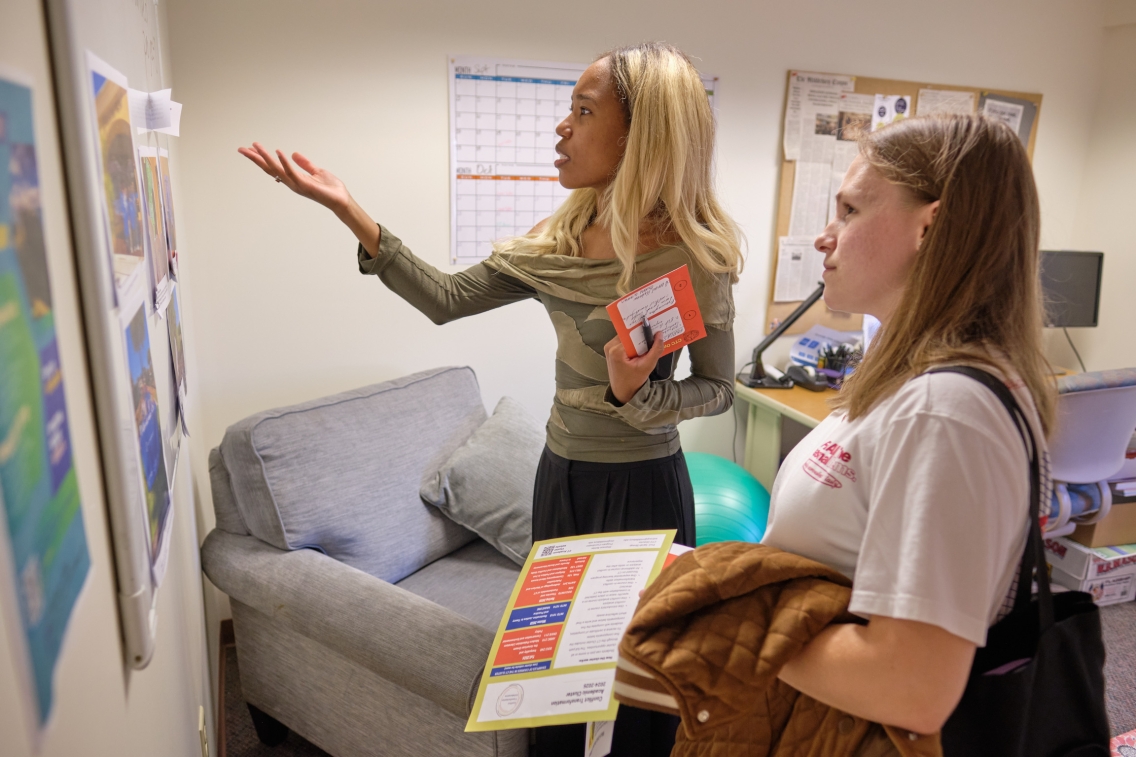Academic Cluster
Academic clusters are a flexible, optional way for students to build connections between and among disciplines and experiential learning. The Conflict Transformation (CT) Cluster is not a formal major or minor, but a program in which students can foster the knowledge, skills, and dispositions to enable more constructive engagement in conflicts.

How the CT Cluster Works
The CT approach seeks to engage with conflict at all levels (micro, meso, macro) and across many different issue areas. The CT Cluster offers students a chance to expand their understanding of conflict and foster skills and dispositions for conflict transformation.
Students can join in some or all cluster opportunities. The full path through the CT Cluster includes the five components below. To receive a certificate of completion, students will complete the five components and write a final short reflective essay (submitted on the CT Cluster Canvas site).
- One introductory course in conflict analysis
- One conflict analysis course on a specific issue or place (selected in consultation with the CT director)
- One course in conflict transformation skills
- One experiential learning program focused on CT (see criteria in FAQ below)
- An additional course in conflict analysis or skills after the experience
Within the categories above, there is substantial flexibility across a diverse array of approaches to conflict. Students majoring in programs of study that emphasize conflict analysis are encouraged to take two CT skills courses. Students interested in the cluster are encouraged to meet with the CT Collaborative director to discuss the specific conflict(s) they want to learn more about and skill-building opportunities.
Students can register for the cluster at any time by enrolling in the CT Cluster Canvas site (use button below). Please visit us at Bowker Barn, attend one of our events, or email conflicttransformation@middlebury.edu.
What You Will Learn
The CT approach is centered around the pursuit of learning goals(knowledge, skills, and dispositions):
Knowledge: Engaging with conflict and change necessitates understanding ourselves, the communities we are working in, and the potential tools one can mobilize.
Skills: Participants can ethically mobilize a range of tools to catalyze conflict for productive change, and steward change for productive conflict.
Dispositions: Participants will cultivate enduring attitudes that shape their engagement with themselves and others in specific cultures, contexts, and communities.
Courses and Opportunities
To see the full list of courses approved for the CT Cluster, click here.
Many of the experiential opportunities that count for the cluster are also listed at the websites of the Center for Community Engagement and the Center for Careers and Internships.
Certificate of Completion: List of Students
As of May 2025, 52 students have completed at least three (3) of the cluster requirements. The following students have completed the full sequence of courses and experiences and earned a Conflict Transformation Certificate at Middlebury. They are listed by graduation year.
- Shane Silverman ‘24.5
- Lillian Prime ‘24.5
- Youness Cheboubi ‘25
- Liza Grebenkina ‘25
- Vyas Nageswaran ‘26
Frequently Asked Questions
Can courses taken for the cluster also count towards a major or minor?
Absolutely. We already have a system that allows courses to count for majors/minors and for college -wide distribution requirements. Similarly, the CT cluster complements but does not compete with existing programs of study, as each of our courses contains multiple lessons for students. For example, students in a political science course may learn theories of international conflict important in the discipline while encountering questions about post-conflict peacebuilding.
What are the criteria for the experiential learning component?
The experiential component must meet four criteria: (1) involve at least four weeks of engagement, (2) involve at least 60 hours of engagement within one year within one program, (3) address the Cluster’s learning goals with intention through reflective practice, and (4) involve engagement with collaborators beyond Middlebury. Many programs in the Center for Community Engagement (CCE), the Center for Careers and Internships (CCI), and the Schools Abroad meet these criteria - the spreadsheet above has examples as well as contact information for CT Collaborative partners.
Does being part of a CT Cluster guarantee entrance into particular courses?
Generally, no. The cluster creates no obligation on faculty to let cluster students into their courses. We expect faculty to treat requests for space in a class in the same way as they currently negotiate a variety of rationales from students. The one exception is the “Conflict Transformation Skills” course – students interested in completing the cluster will receive special consideration for spaces in the course.
What is the relationship between the CT Cluster and the Privilege and Poverty (P&P) Cluster?
The CT approach at Middlebury has been greatly enhanced by a partnership with the Privilege and Poverty (P&P) cluster. The CT Collaborative offers financial support for the P&P field experiences, and we have been working in partnership with P&P staff and faculty to develop learning and skill-building opportunities. The P&P cluster focuses on a particular conflict issue - economic inequality – and students interested in this issue should complete the P&P cluster.
Are you offering a professional certification in Conflict Transformation?
There is no professional certification that comes with this certificate. We will provide valuable opportunities for undergraduates to develop new knowledge, practice new skills, and foster dispositions that can support constructive engagement in conflict. The certificate of completion will state that the students have completed a 5-part sequence in the study and practice of conflict transformation at Middlebury College. This provides a public record of completion (clusters are not listed on student transcripts).
Contact
Sebnem Gumuscu
Associate Professor of Political Science
- Email:
- sgumuscu@middlebury.edu
- Tel:
- (802) 443-5393
- Office:
- Robert A. Jones '59 House 107
- Office Hours:
- Fall 2025: Monday - Wednesday 2:30-4:00 PM, and by appointment


